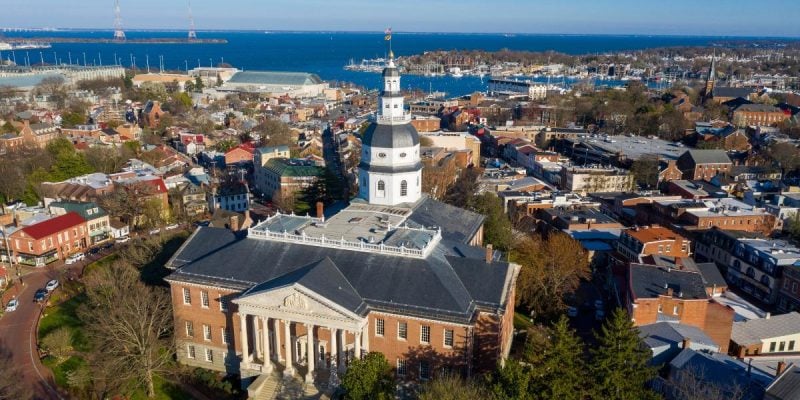Maryland Rep. Vanessa Atterbeary is going her own way with a new Maryland online casino bill.
The House Ways and Means chairwoman filed HB 1319 Friday. While the legislation shares some details in common with Sen. Ron Watson’s SB 603, it is not a companion bill in the slightest.
Among the differences, Atterbeary’s bill contains up to 12 untethered online casino licenses and separate tax rates for electronic and live-dealer games.
Any Maryland online casino bill passed would need approval from voters in November to amend the state constitution.
Differences in Maryland House online casino bill
Atterbeary’s HB 1319 appears to put online casino licenses up for a competitive bid. It specifies that the Maryland Lottery and Gaming Control Commission may issue not more than 12 internet gaming licenses.
The bill states that, in reviewing applications, the commission shall consider the percentage of proceeds the applicant proposes to retain.
Other key details of HB 1319, with corresponding Senate language in parenthesis, include:
- Establishes a minimum tax rate for electronic games at 55%. (SB has 47%)
- Sets the tax rate for live dealer games no lower than 20%. (SB does not separate tax rate).
- Licensees pay an initial fee of $1 million for a five-year license. (SB same for four years)
- Renewal fee equal to 1% of licensee’s average annual proceeds over the previous three years. (SB same)
- Operators don’t have to pay taxes on promotional credits the first year of operations. Following the first year, they can only write off 20% of promotional credits redeemed by players. (SB same)
- Live dealer studios must be located in state but not at a casino. (SB same)
- Requires licensees to enter a labor peace agreement with labor unions to prohibit work stoppages during the first five years. (SB doesn’t include)
- The commission may enter into multijurisdictional agreements with other states to share player pools. (SB same)
- In disbursing iGaming tax revenue, the House bill earmarks 1% for regulatory costs, 1% to a problem gambling fund , 1% to local counties for education funding, and the bulk to education under the Blueprint for Maryland’s Future Fund. (SB doesn’t have 1% to local counties)
PlayUSA is tracking all online casino bills considered by state legislatures in 2024.
Diversity and inclusion language a focus
The House bill increases methods to ensure diversity and inclusion in Maryland’s online casino markets. Requirements include:
- Licensees must be 5% owned by individuals with a net worth not exceeding an amount to be determined by the commission to “encourage diversity, equity and inclusion in the internet gaming industry.” OR the applicant has established a profit-sharing agreement with nonmanagement employees whose net worth does not exceed the amount determined by the commission.
- Applicants must produce a workforce development plan for hiring in-state jobs and a plan for employing individuals from economically disadvantaged areas.
- Within 30 days of being awarded a license, operators must submit a diversity plan to the commission. Each licensee must make a good-faith effort to meet the diversity objectives outlined in its plan.
Measures taken to address problem gambling
In order to assist individuals who might have a gambling problem, the bill requires that licensees:
- Display “If you or someone you know has a gambling problem and wants help, call 1-800-GAMBLER,” or comparable language approved by the commission, at log-on and log-off.
- Provide mechanisms for players to self-limit money deposited into their accounts over a certain amount of time.
- Allow players to temporarily suspend their access to gamble on the site.
- Display a problem gambling disclosure concerning the risks that each account holder must certify upon account creation and a monthly basis.
Which Maryland online casino proposal will win out
Watson took the lead in first introducing Maryland online casino legislation last year.
As chair of the Ways and Means Committee, Atterbeary holds a more influential position in the Maryland legislature.
Watson and Atterbeary seem likely to work on the differences of their legislation. Atterbeary invited Watson to sit next to her in a briefing of a Maryland iGaming study presented at her committee. However, Watson told PlayUSA that he hadn’t seen Atterbeary’s bill before its introduction.
With the high tax rates, industry representatives approached by PlayUSA don’t view either proposal favorably at this time but are eager to work with the sponsors.
“We are pleased momentum is building and that Chairwoman Atterbeary and Sen. Watson have taken lead roles to shape the policy with an emphasis on job creation and equitable participation,” John Pappas, state advocacy director with industry advocacy group iDEA Growth told PlayUSA. “Lawmaking is a process, and I believe that a consensus approach will emerge that benefits consumers, the state and the industry.”
Atterbeary’s bill had a first read Friday in her Ways and Means Committee, and a hearing is scheduled for Feb. 26. Watson’s SB 603 and internet gaming referendum SB 565 are scheduled for a Feb. 28 hearing in the Senate Budget and Taxation Committee.








